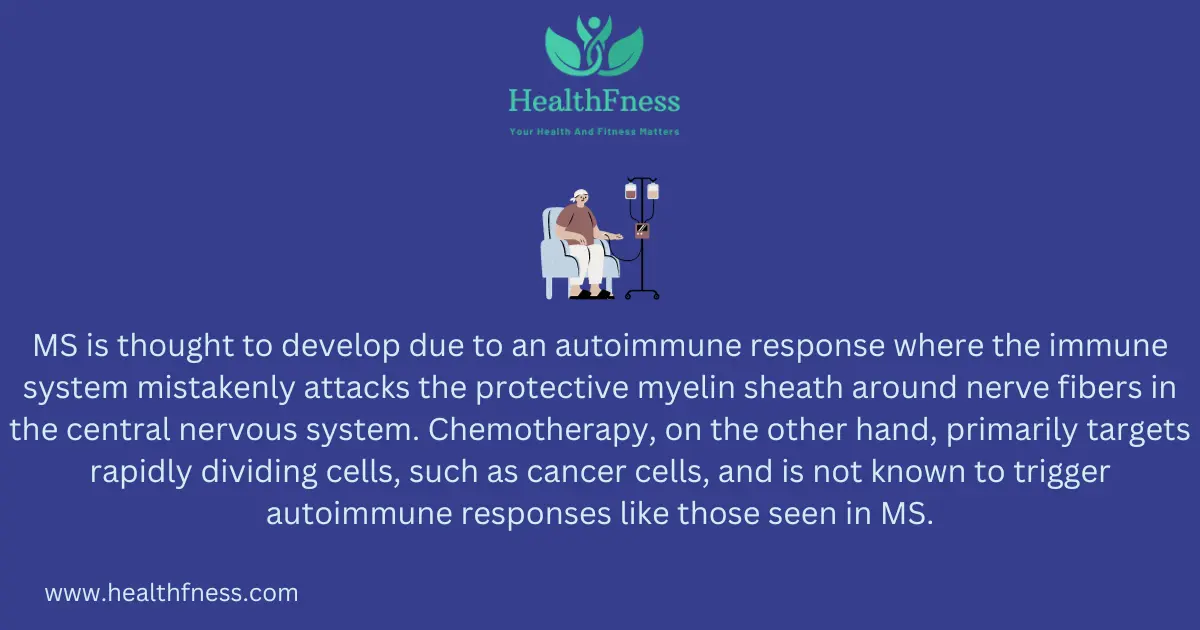Can chemotherapy cause multiple sclerosis? It’s a question of millions of people in the world.
In this blog post, we explore into the complex relationship between chemotherapy treatments and the development of multiple sclerosis. By exploring the latest research and expert insights, we aim to provide you with a truth about this question, so you can make informed decisions about your health journey.
So let’s get started.😊
Can Chemotherapy Cause Multiple Sclerosis?
One study published in the journal Neurology investigated the association between chemotherapy patients and the risk of developing MS or other diseases.
The researchers analyzed data from cancer patients and found a slightly increased risk of MS or demyelinating disease among individuals who had undergone chemotherapy compared to those who had not.
However, the study also noted that the absolute risk of developing MS remained low, and further research is needed to confirm these findings.
On the other hand, a systematic review published in JAMA Neurology examined the available evidence on the association between chemotherapy and the risk of MS.
The review concluded that while some studies suggested a possible link, the overall evidence was limited and inconclusive. The authors emphasized the need for more research to better understand any potential relationship between chemotherapy and MS.
Summary: In the end, we can say that it is not obvious that if a person undergoes chemotherapy they will surely have multiple sclerosis.
And if you want to understand multiple sclerosis click here.
Cancer Treatment and Multiple Sclerosis
Cancer treatments like chemotherapy, while life-saving, have raised questions about their potential link to multiple sclerosis (MS), a neurological condition. Some studies suggest a possible connection, but the evidence isn’t clear-cut.
It’s like trying to solve a puzzle with missing pieces. While there’s a hint of a link, we need more research to understand if and how cancer treatments might affect the risk of developing MS.
If you’re undergoing cancer treatment and worried about MS, talk to your doctor. They can give you the best advice based on your individual situation.

You May Also Like To Read: Can A Person with Multiple Sclerosis Donate Blood?
What Are the Complications of Chemotherapy?
Like every treatment chemotherapy has its own side effects and complications like:
- Nausea and Vomiting: Chemotherapy can cause queasiness and throwing up.
- Fatigue: Feeling very tired and lacking energy is common during treatment.
- Hair Loss: Many chemotherapy drugs can make hair fall out, including eyebrows and eyelashes.
- Weakened Immune System: Chemotherapy can lower the body’s ability to fight infections.
- Anemia: Some chemotherapy drugs can decrease red blood cell count, causing fatigue and weakness.
- Nerve Damage: Tingling, numbness, or pain in the hands and feet can occur.
- Mouth Sores: Chemotherapy can lead to painful sores in the mouth and throat.
- Constipation or Diarrhea: Changes in bowel habits are common side effects.
- Loss of Appetite: Chemotherapy may make food less appealing, leading to weight loss.
- Increased Risk of Bleeding or Bruising: Chemotherapy can reduce platelet count, which helps blood clot.
Factors to Consider
Existing Research: The existing research on the potential link between chemotherapy and multiple sclerosis (MS) presents a mixed picture.
Types of Chemotherapy: When examining the potential link between chemotherapy and MS, researchers have investigated whether specific types of chemotherapy drugs are more commonly associated with an elevated risk.
Other Risk Factors: In addition to chemotherapy, other factors may contribute to the relationship between cancer treatment and MS risk. Genetic predisposition, for example, could influence an individual’s susceptibility to developing MS following chemotherapy.
Patient Perspectives: Considering the perspectives of individuals undergoing chemotherapy is crucial when discussing the potential link to MS. Patients may have valid concerns about their long-term health outcomes, including the risk of developing MS.
For in-depth information, you can read this study: Chemoradiation-induced multiple sclerosis-like demyelination
Conclusion
- The current research on the potential link between chemotherapy and multiple sclerosis (MS) presents a mixed picture, with some studies suggesting a possible association but no definitive evidence.
- Specific types of chemotherapy drugs have been investigated for their potential association with MS risk, but the evidence remains inconclusive.
- Other factors, such as genetic predisposition and underlying autoimmune conditions, may also play a role in the relationship between chemotherapy and MS risk.
- Patient perspectives are essential to consider, as individuals undergoing chemotherapy may have valid concerns about their long-term health outcomes.
- Overall, while there is ongoing research in this area, it’s important for individuals undergoing chemotherapy to discuss any concerns about MS risk with their healthcare provider and stay informed about the latest developments in research.

Dr. Mark Jenkins, MD - General Physician (California, USA)
Dr. Mark Jenkins is a board-certified general physician based in the United States, specializing in preventive medicine, nutrition, and lifestyle health. With years of clinical experience in primary care, he is dedicated to helping patients and readers alike make informed, science-based decisions about their well-being.
As a trusted medical reviewer and contributor to Healthfness.com, Dr. Jenkins ensures that all health content meets the highest standards of accuracy, safety, and evidence-based medicine. His expertise bridges modern medical science with practical, everyday wellness strategies, making complex topics approachable for all audiences.
Outside the clinic, Dr. Jenkins is passionate about living the healthy lifestyle he teaches. He enjoys hiking with his dog, experimenting with vegetarian cooking, and exploring the latest health research. He believes that small, consistent lifestyle changes lead to lasting health improvements, and he aims to inspire readers to take proactive steps toward a healthier, happier life.
Explore more of Dr. Jenkins’ evidence-based insights at Healthfness.com



